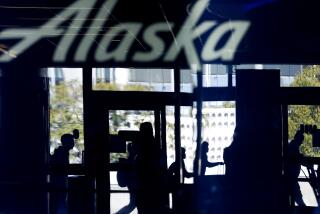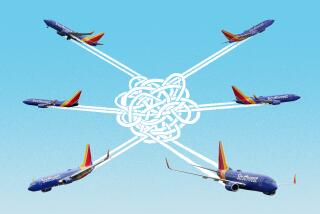Airlines Hesitate to Take Federal Loans
- Share via
Within days after Sept. 11, the airlines pleaded for a bailout from Congress because they claimed they otherwise faced insolvency. Yet nearly two months later, not one airline has yet applied for the biggest chunk of the rescue package: federal loan guarantees.
The smaller, initial part of the bailout--$5billion in cash grants sent directly to individual airlines--helped the carriers survive the immediate cash crunch from the two-day shutdown of civilian air travel after the attacks and the lingering slump in passenger traffic.
But even though the airlines continue to lose millions of dollars a day, the $10 billion in loan guarantees are still there for the taking, said Betsy Holahan, a spokeswoman for the Air Transportation Stabilization Board, the newly formed panel that will decide which loans to back.
One distressed carrier, America West Airlines, does “anticipate filing in the very near future” because it’s been unable to get conventional financing, spokesman Jim Sabourin said. But nearly all the other major airlines say they’re still evaluating the idea, and the cash aid has given them the breathing room to do so.
“We have made no decision at this point,” Northwest Airlines Chairman Richard Anderson said at an industry conference this week. “We will be prepared to use the program if we need it.”
Why the hesitation? Some industry executives and analysts point to a number of factors, including the bureaucratic slowness of setting up the government review panel and concerns about the application rules.
The federal board is still waiting for congressional funding to hire its managers and staff. The staff would make recommendations to the four-member board, which is headed by Federal Reserve Chairman Alan Greenspan.
Until that staff is in place, the airlines might be holding back their requests, although it doesn’t prevent them from applying, and America West’s Sabourin said that wasn’t a factor in his airline’s timetable for seeking federal help.
But other airline executives, at least publicly, are saying they’ll take a go-slow approach. In many cases, the loan guarantee program is being portrayed not as the urgent priority it appeared to be shortly after Sept. 11 but as a lender of last resort.
“If you have no other way to tap funds, then it might be the only place to go,” said Michael Allen, chief operating officer of Back Aviation Solutions, an industry consulting firm in New Haven, Conn. “But there might be other ways for the airlines to solve the problem.”
Robert Aliber, a University of Chicago finance professor who tracks the industry, said that “when the airlines asked for the program they were panicked; they had been shut down for two or three days completely.” But many airlines now see “their cash position is stronger than they thought it would be,” he said.
Some also suggest that the airlines are waiting for one of their competitors to take the lead so that the others can better gauge what kind of loan they should request, what the terms might be and what concessions they might have to make to win government approval.
Other carriers “will be a good benchmark about how to approach this process,” Rakesh Gangwal, US Airways’ chief executive, said in a conference call with analysts last week.
The airlines’ wariness isn’t entirely surprising because the industry reacted with caution a month ago when the new board laid out its rules for judging loan applications. Indeed, the board made it clear that loan guarantees don’t amount to an entitlement but will be granted based on each airline’s situation.
The criteria, among other things, call for each applicant to gain concessions from its workers, vendors and other partners; request long-term projections of the airline’s future performance; and ask the airline to say whether it’s prepared to give the government stock ownership if the carrier defaults on the loan.
But at this point the airlines aren’t sure to what degree they should follow those rules to get the stabilization board to approve their loans. For example, exactly what concessions from employee unions might satisfy the board? How much of an equity stake should an airline pledge to the government?
“Nobody wants to rule out the possibility” of seeking a loan guarantee, “but no one wants to go first,” an industry source said.
The airlines know they can’t wait too long, although they have until June to apply.
More than one executive has expressed concern that if they wait too long, they could find that their competitors already have tapped the entire $10billion in guarantees.
Even so, some of the biggest carriers, such as Northwest, Delta Air Lines and AMR Corp.’s American Airlines, aren’t expected to rush in with applications, because they still have sizable amounts of cash on hand.
They also still have planes and other assets they can pledge as collateral to borrow from conventional lenders.
How soon any of them apply could depend on whether passenger traffic comes out of its doldrums in the next two months, over the busy holiday season, analysts said.
Some airlines, such as Continental, said they’re beginning to see a slight increase in the average revenue they’re receiving from each passenger. And Continental Chairman Gordon Bethune said that’s why his airline doesn’t plan to file for a government-backed loan.
But even Southwest Airlines, considered among the healthiest carriers in the industry, sees the bailout as worth pursuing. “We want to be in line,” James Parker, Southwest’s chief executive, said at the industry conference this week. “I’m not exactly sure how we’d use the money, but I’m sure we’d find a way.”
More to Read
Inside the business of entertainment
The Wide Shot brings you news, analysis and insights on everything from streaming wars to production — and what it all means for the future.
You may occasionally receive promotional content from the Los Angeles Times.











